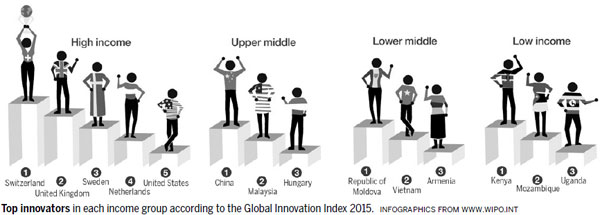Switzerland, the United Kingdom, Sweden, the Netherlands and the United States are the world's five most innovative countries, while China, Malaysia, Vietnam, India, Jordan, Kenya and Uganda are the countries outperforming their economic peers, according to the Global Innovation Index 2015.
Co-published last week by the World Intellectual Property Organization, Cornell University and INSEAD business school, the index ranked the innovation performance of 141 economies around the world, based on 79 indicators.
The report found that the group of top 25 performers, all high-income economies, remained largely unchanged from last year's rankings, illustrating that the leaders' performance is hard to challenge for those that follow.
China, which was ranked 29th, was the only economy in the top 30 that belongs to the upper-middle income group. Malaysia and Hungary followed China in the same group.
In areas such as human capital development and research and development funding, China's performance was similar to some of the top 25 high-income countries, according to WIPO.
Southeast Asia and the Oceania region were led by Singapore, ranking seventh, and Hong Kong, at 11th. South Korea, New Zealand and Japan were also ranked within the top 20 and half of the region's economies were in the top 40.
In terms of innovation quality, the US and the UK stayed ahead of the pack, largely as a result of their world-class universities, closely followed by Japan, Germany and Switzerland.
Top-scoring middle-income economies for innovation quality were China, Brazil and India, with China "increasingly outpacing the others".
"Innovation quality matters. Creating world-class universities and investing in research is essential for staying ahead in the global race for successful innovation," said Soumitra Dutta, a co-editor of the report and dean of the Samuel Curtis Johnson Graduate School of Management at Cornell University.
The GII 2015 explored the impact of innovation-oriented policies on economic growth and development.
"Innovation holds far-reaching promise for spurring economic growth in countries at all stages of development. However, realizing this promise is not automatic," said WIPO Director General Francis Gurry.
"Each nation must find the right mix of policies to mobilize the innate innovative and creative potential in their economies," he added.
The report found that a well-coordinated innovation policy plan with clear targets and a matching institutional setup have proven to be a tool for success.
The report's analysis shows that increasing business sophistication, including business linkages to science and its institutions, foreign subsidiaries and the recruitment of scientists, is often the single biggest challenge in developing economies.
While significant resources are often devoted to attracting foreign multinationals and investment, policymakers of developing countries should consider how to "capture and maximize positive spillovers to the local economy".
The report also suggested that developing countries pay more attention to locally developed researchers and innovators not to leave these precious resources idle, and steer innovation and research to context-specific solutions to local challenges, which may not be frontier technologies or part of existing global value chains.
The report has a chapter on China, which said the nation's evolving science and technology policies and its economic reforms have had a profound effect on the outcome of innovation in the country since their beginning in the 1980s, especially from 2002 to 2012.
According to the report, some positive lessons could be learned from China by other countries and regions, including increased R&D investment with a large increase in GDP, education system improvement and rapid increase of patent applications.
However, the report noted that quite a large gap still exists between China and developed nations in terms of investments in basic research, high-value inventions and high-impact research, which are all essential for entering the high-income category of nations.
The GII started in 2007 and it was the eighth edition this year.
zhangzhao@chinadaily.com.cn

(China Daily 09/23/2015 page16)

